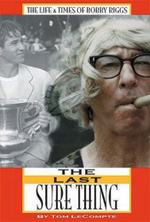The Triple Crown and
the Triple Bet
Tom LeCompte

Before the start of Wimbledon in 1939—his first and only appearance there--Bobby Riggs walked into one of London's legal bookmaking parlors. An American magazine writer several years later wrote, "This particular bookmaker was confronted a day before.the tournament began by a customer with an outrageous notion in his head."
As excerpted here from the June 1950 issue of Sport magazine, the exchange went like this: "In America," he said, "we like to make parlay bets. You know, if you win on the first one, all the money goes on the second one, and if you win on the second one, the whole pile rides on the third one-and so on. You know what I mean? Ever hear of it?"
The Englishman nodded his head gravely. "Well, I want to get down a parlay on this tennis tournament. We've got some pretty good American players in it, you know." "So I have heard," agreed the proprietor. "Of course, Wimbledon is a world championship tournament."
A note of national pride crept into his voice. "There are many fine players here this year, in addition to yours."
"There won't be any of them in the final, I'll bet," said the customer with a grin.

"That," said the bookmaker, who was beginning to get a trifle annoyed, "remains to be seen."
"What I want," the U.S. booster announced, "is to make a bet that this fellow Riggs will win the men's singles, the men's doubles, and the mixed doubles. How about it? What odds will you give on that?"
The bookmaker simply looked pained. Unquestionably, he was beginning to believe everything he had ever read about the crazy Americans. "I can't consider it," he said, frostily. "It's out of the question."
"Why?"
"It's ridiculous. No one man is going to win all those championships. My conscience would not allow me to accept such a wager."
"For cryin' out loud, what's your conscience got to do with it? Don't you want to take my money?"
By now, the Englishman was plainly out of patience. "I shall be pleased to accommodate you if you wish to back Mr. Riggs to win the gentleman's singles," he said, stiffly.
So the bet was made, 10 pounds at 3-1 on Riggs to win the singles, no parlay. Bobby left the shop, tucking the bookmaker's receipt into his wallet: "Mr. Riggs to win the gentlemen's singles." As he did.
On paper, Bobby's performance during the fortnight was spectacular. He advanced to the final with the loss of just two sets, posting straight-set victories over India's Ghaus Mohammed in the quarterfinals and World No.8 Franjo Puncec of Yugoslavia in the semifinals.
On the other side of the draw, Elwood Cooke, Bobby's good friend and doubles partner, played some of the finest tennis of his career, eliminating, among others, top-seeded Bunny Austin in straight sets.

With the Queen Mother sitting in the royal box, the two Americans took to the court on a beautiful July afternoon. The audience, though surely apprehensive at the sight of two newcomers facing off for the world's preeminent title, remained excited, assured in the knowledge that the magnitude of Wimbledon and the depth of the field it attracted always produced true champions.
The overwhelming favorite to win, Bobby had played Cooke a dozen times and had never lost. Like Bobby, Cooke preferred to stay on the baseline, keeping the ball in play, driving shots deep into the comers, and occasionally luring his prey into the net, where he could then win the point on a crisp passing shot.
Bobby, however, had many more weapons at his disposal. He could stay back and match Cooke shot for shot. He could charge into the net and end the point with a sharply angled volley.
He could lure Cooke in with a deft drop shot, then send him scurrying back with his deadly accurate lob. Bobby could direct his serve all over the service box, sending his opponent lunging in an effort to return the ball.

Bobby had the ability to always keep Cooke guessing. But as the match progressed Cooke's odds looked good. He roared through the first set, winning it 6-2, and was up 5-3 in the second. After all, perhaps no one knew Bobby's vulnerabilities better than his best friend and doubles partner, and Cooke took full advantage.
As he had so many times before, Bobby dug in his heels, adjusted his game, and fought back to go up 6-5. But Bobby let up, allowing Cooke to recover his momentum and even the set at 6-6. But then Bobby adjusted his game, winning his serve and breaking Cooke to take the second set, 8-6.
In their previous matches, Cooke had shown a tendency to fall victim to his own nerves. He missed easy shots, blew big leads, and basically handed the victory to Bobby. Today, however, playing in the biggest match of his life, Cooke remained calm. He breathed deeply, regained his composure and focus, and went out and dominated Bobby in the third set, 6-3.
But if Bobby was nervous, he didn't show it. Cooke may have been winning more points than Bobby, but he was paying a high price. Bobby kept the ball endlessly in play, making Cooke hit 15 or 20 shots and keeping his friend on the run.
The tactic worked; by the fourth set Cooke was clearly tired, and the mistakes started to add up. Bobby outlasted Cooke, winning the final two sets, 6-3, 6-2. Jumping over the net to congratulate his defeated friend, Bobby was now champion of the world.
On a beautiful summer's day, in a hard-fought five-setter, Bobby's dream had come true. But like many an attained dream, the reality was skewed. The fans at Centre Court that day pined for the energy and power of former champions Don Budge, Ellsworth Vines, or Fred Perry.

Elwood Cooke, though an accomplished player, was hardly a household name and never in the same league as Bobby. Though this was Wimbledon and anything could happen, the match never engaged the interest of the fans.
One London writer said, "From a box-office point of view the men's single final hit a new low." Called one of the strangest as well as one of the dullest Wimbledon final ever, most of the time the two players never seemed in sync, either running off long streaks of games that alternately made their opponent look like "a second-rater" or exchanging long, metronomic cross-court rallies that looked more like practice drills than a Wimbledon final.
Wrote a columnist for the London Daily Mirror: "Riggs finished off his man by slow Torture. Those who like a dash of blood with their lawn tennis went out to tea."
By the middle of the second set many spectators had seen enough. Dubbed the "colossal Wimbledon walk-out" by yet another newspaper, hundreds of fed-up fans started streaming from Centre Court, clambering noisily over the benches to depart while play was in progress, leaving the two finalists to play to a half empty house.
But Bobby came off smiling. He had won the grandest tournament of them all. After his victory, he enjoyed a visit for tea with the Queen Mother. Then after tea, Bobby returned to the bookmaker's parlor to collect on his 10-pound wager.

The next day, the doubles partners and singles finalists, Bobby and Elwood defeated the British team of Charlie Hare and Frank Wilde, 6-3, 3-6, 6-3, 9-7, to win the gentlemen's doubles trophy.
This caused the bookmaker to become curious about this Riggs fellow. "He began to wonder if he had done that wildeyed bettor a favor, after all," the American reporter later wrote.
When Bobby and partner Alice Marble reached the final of the mixed doubles championship, the bookmaker became truly concerned. Could he have been wrong? He went to the final to see for himself.
The black-haired, short-legged man and the tall, graceful girl rarely missed. It was an impressive demonstration and Riggs and Marble won hands down.
And then, as he looked closely at the winning team, his' eyes widened in astonishment. For there was something oddly familiar about the little man in the white shorts, standing at the net to receive his third championship trophy of the week. The bookmaker could not believe his eyes—the triple-winner was none other than the same "crazy American" who tried so vigorously to get down a parlay bet on one player to win all three titles! Himself, Bobby Riggs.
But was it the true story? In his first memoir written in 1949, Bobby confirmed this version of events. "So I wound up betting ten pounds on myself to win the singles;” Bobby wrote. "I still have the bookmaker's receipt for that bet on Mr. Riggs to win the gentleman's singles."

Years later, a significantly different version of the tale emerged, one in which the reluctant bookmaker consented to Bobby's farfetched bet. In his 1973 autobiography, Court Hustler, Bobby rewrote the story to read that the bookie gave him 3-to-1 odds on Riggs winning the singles, 6-to-1 on the doubles, and 12-to-1 on the mixed doubles titles.
In this version, the amount bet also metamorphosed, from the original 10-pound wager to 100 pounds. Bobby wrote that after the tournament, "I was at the bookmaker's shop first thing Monday morning to collect on my parlay. It added up to £21,600, the equivalent of $108,000," a small fortune.
As this version came to be repeated over the years, the story took on the weight of legend, becoming the cornerstone of what Bobby called ''Riggs mythology."
But his doubles partner, Elwood Cooke, said, "I don't think he bet on himself in London like he says. I would have known. That was just Bobby. He had his fantasies. It was all fun to him."
Even Bobby's brother, John, who was privy to everything Bobby did, confided years later to one of Bobby's sons that the big bet was a publicity stunt and certainly a harbinger of things to come.
More important than the truth about the parlay, is the fact Bobby won the titles. And he did it on his own terms. He took 18 straight matches--seven in singles, five in doubles, and six in mixed doubles-winning a total 51 of 60 sets played. In winning all three titles, he became one of three men to win the coveted "Triple Crown" (the others were Budge in 1937 and 1938, and Frank Sedgeman in 1952), and the only man to do so on his first attempt.





